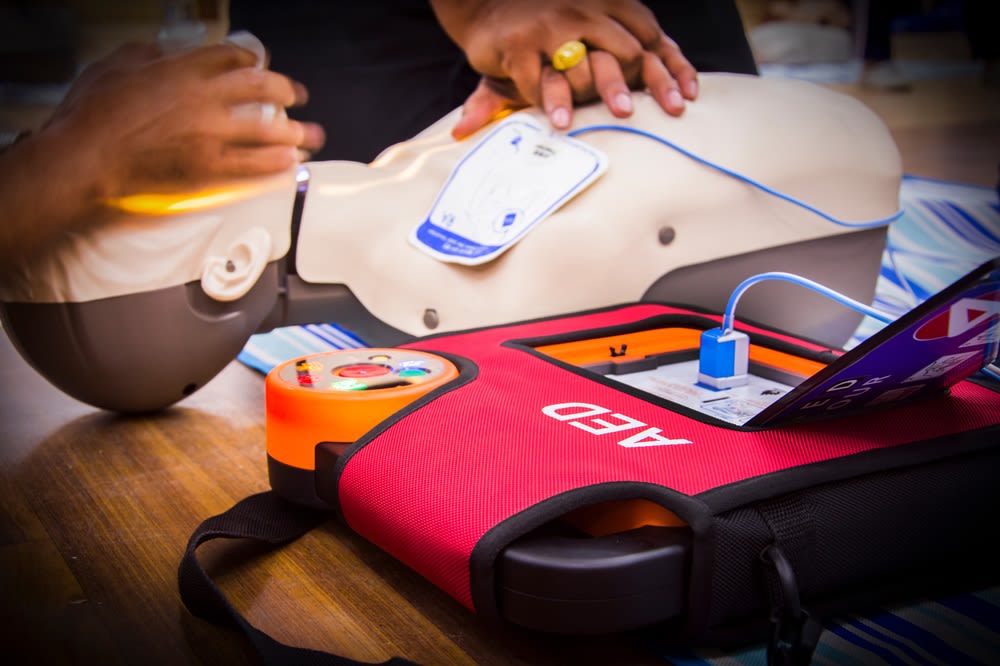
Understanding your legal landscape is critical to running a business. If you’re considering installing an automated external defibrillator (AED), you have several legal obligations to understand.
The legal framework regarding defibrillators for businesses involves a mixture of state and federal laws. Here’s what you need to know.
What Is a Defibrillator?
AEDs are small devices that can analyze heart rhythms and change them when a problem is detected. They’re typically used to address ventricular fibrillation, a condition in which the heart beats in an uncoordinated manner. The Occupational Safety and Health Administration (OSHA) says this issue is typically responsible for sudden cardiac arrest.
Why should you consider a defibrillator? These devices can help save the life of an employee in crisis and assist visitors who experience cardiac problems within your facility. The presence of an AED, and staff members who know how to use it, could save a life in your place of business.
Who Is Required to Have a Defibrillator?
Some types of businesses can consider AEDs optional. In other cases, they’re considered mandatory.
The Sudden Cardiac Arrest Foundation says federal laws require AEDs in federal buildings. While state laws can vary, most require AEDs in places like the following:
Schools
Health clubs
Assisted living facilities
Pools
Nursing homes
Your legal counsel can help you understand if you’re required to have these devices on the premises due to state or federal laws. If you’re required to have one and do not, you could face citations.
Can Anyone Install a Defibrillator for Businesses?
A defibrillator is a powerful instrument, but it’s remarkably easy to install. Many kits come with clear instructions that guide you from one step to the next. However, there are regulations involving who can both order and install AEDs.
The U.S. Food and Drug Administration (FDA) regulates the sale of devices like AEDs. Per those regulations, a licensed medical authority must prescribe the device and ensure that people who use it are trained. In some locations, businesses are required to notify local emergency response system (EMS) organizations when the device is installed.
If you’re in a legal environment where a prescription is required, you’ll probably know it. You won’t be able to order a machine if you want one.
Are You Required to Train Your Staff?
Per FDA regulations, a medical professional should train your staff on how to use an AED and follow up the work with another life-saving technique, such as CPR. States have rules about what the training should include, how long the course should last, and how often it should be repeated.
If you’re in an environment in which you must train your staff and you don’t do it, you could face citations or lawsuits if you get caught. Get clarity on what is required in your area to ensure you stay compliant.
Training could also ensure that your AEDs are actually used in an emergency. If staff members don’t feel comfortable using the device, they won’t step in during a medical crisis. After appropriate training, they may be much more likely to act in an emergency.
What About Legal Protections in an Emergency?
Most states have Good Samaritan laws that protect people trying to help when something goes wrong. However, those laws can include loopholes that every business owner should know about.
Good Samaritan laws often exclude actions people take that aren’t covered by training. If someone has a cardiac issue in your business, and untrained staff members try to help, the person could sue the company, the employee, or both.
Some people revived with AEDs are incredibly grateful to still be alive and breathing, so they wouldn’t consider a lawsuit. However, others may have a different experience. You want to ensure you’re covered.
What About Maintenance?
Some regulations regarding defibrillators for businesses involve how often the device must be inspected, cleaned, and repaired. The Centers for Disease Control and Prevention explains that more than 40 states have laws that either encourage or require maintenance and testing.
Some states have regulations about AEDs in specific spots (like schools), but others are more sweeping. If you don’t perform maintenance on your AED and it gets used, you could face legal complications like lawsuits or citations.
Routine maintenance can also ensure that your machines are ready to use in an emergency. Without this critical step, your AED could be little more than a simple box hanging on the wall. Get on a regular maintenance schedule to ensure your AED is in good working order when it’s needed.
Alsco Uniforms Health & Safety
Whether you’re required to install a defibrillator or you just want to add protection for your staff and clients, AEDs are good investments. Health and safety services from Alsco Uniforms could help you to get set up. Let our team provide you with the supplies you need and maintain your devices appropriately. With this step, you’ll be ready for whatever comes next.
References
Automated External Defibrillators (AEDs). Occupational Safety and Health Administration.
CPR and AED Laws. Sudden Cardiac Arrest Foundation.
AED Programs Q&A. (April 2018). American Heart Association.
AEDs and Good Samaritan Laws. (December 2015). Industrial Safety and Hygiene News.
Good Samaritan Laws and CPR. Emergency First Response.
Public Access Defibrillation (PAD) State Law Fact Sheet. (May 2024). Centers for Disease Control and Prevention.
